Ozempic® (semaglutide) Injection vs Other Type 2 Diabetes Medicines
How Ozempic® compares
See how Ozempic® compares to other medicines in head-to-head studies

Ozempic® has been proven to significantly lower blood sugar and A1C.
Ozempic® lowered A1C better
A 40-week study compared Ozempic® 0.5 mg with Trulicity® 0.75 mg and Ozempic® 1 mg with Trulicity® 1.5 mg in 1201 adults with type 2 diabetes who were taking metformin.
Average change in A1C
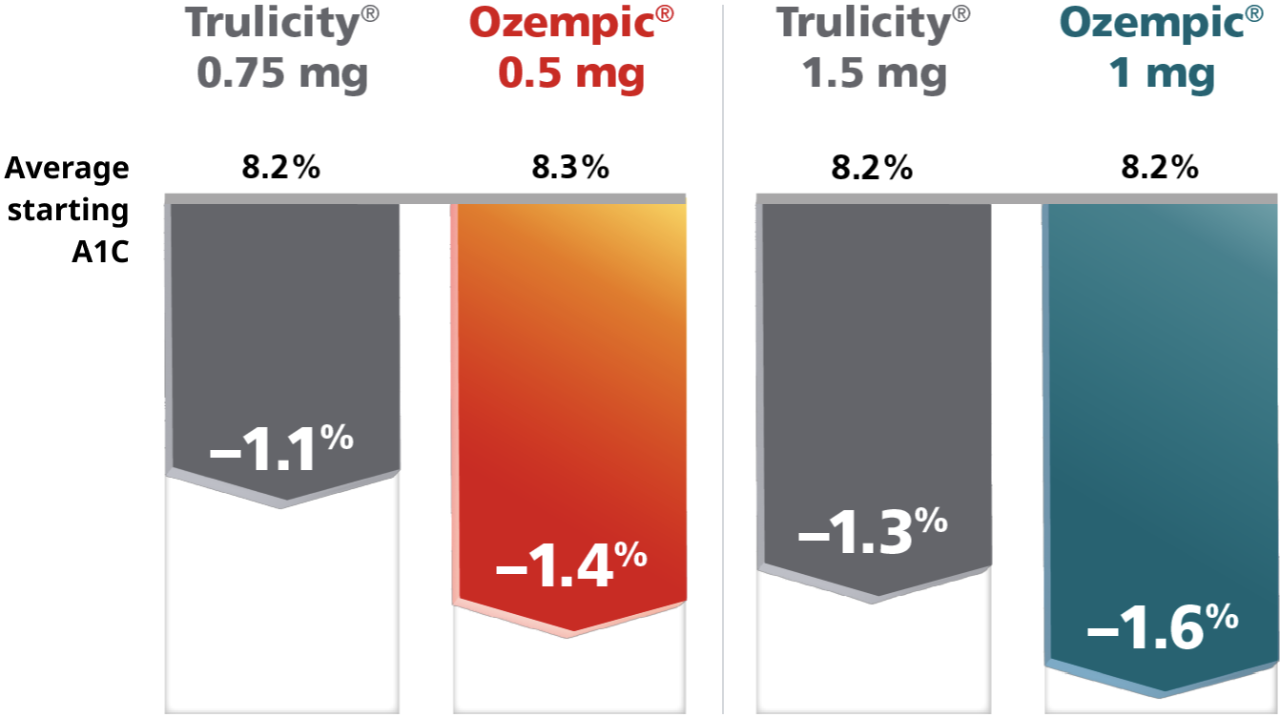
The most common side effects of Ozempic® may include nausea, vomiting, diarrhea, stomach (abdominal) pain, and constipation.
In the same study, Ozempic® helped more people reach an A1C goal of less than 7%.
51%
of people with a starting A1C of 8.2% who took 0.75 mg Trulicity® lowered their A1C below 7%
vs
65%
of people with a starting A1C of 8.3% who took 0.5 mg Ozempic® lowered their A1C below 7%
63%
of people with a starting A1C of 8.2% who took 1.5 mg Trulicity® lowered their A1C below 7%
vs
73%
of people with a starting A1C of 8.2% who took 1 mg Ozempic® lowered their A1C below 7%
Ozempic® lowered A1C better
A 56-week study compared Ozempic® 1 mg with Bydureon® 2 mg in 813 adults with type 2 diabetes, in combination with metformin or metformin with sulfonylurea.
Average change in A1C
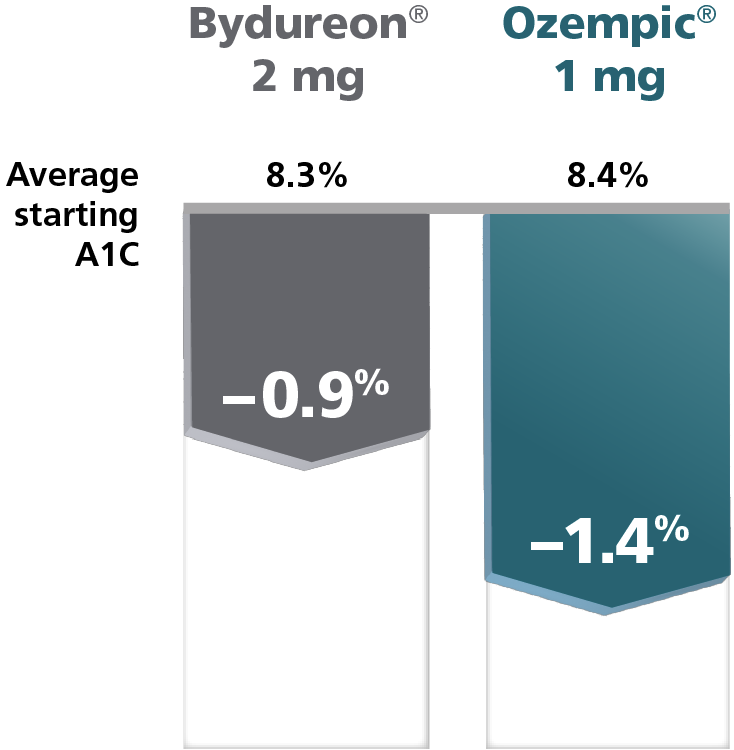
The most common side effects of Ozempic® may include nausea, vomiting, diarrhea, stomach (abdominal) pain, and constipation.
In the same study, Ozempic® helped more people reach an A1C goal of less than 7%.
40%
of people with a starting A1C of 8.3% who took Bydureon® 2 mg lowered their A1C below 7%
vs
62%
of people with a starting A1C of 8.4% who took Ozempic® 1 mg lowered their A1C below 7%
Ozempic® lowered A1C better
A 56-week study compared Ozempic® 0.5 mg and 1 mg with Januvia® 100 mg in 1231 adults with type 2 diabetes when both were added to 1 or more diabetes pills.
Average change in A1C
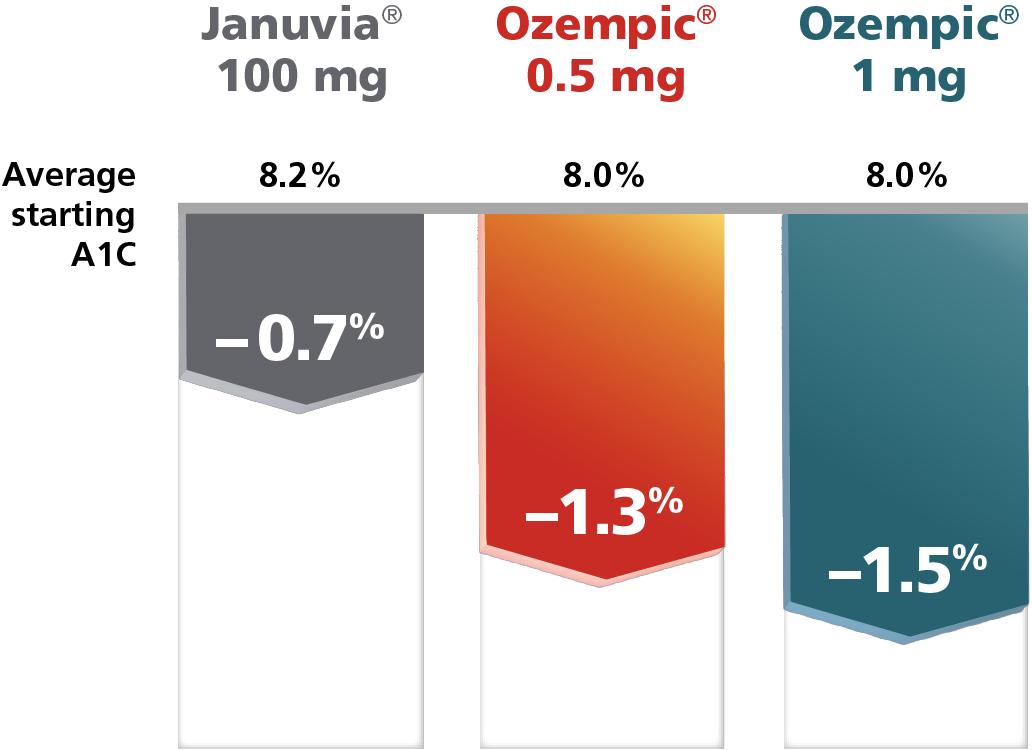
The most common side effects of Ozempic® may include nausea, vomiting, diarrhea, stomach (abdominal) pain, and constipation.
In the same study, Ozempic® helped more people reach an A1C goal of less than 7%.
40%
of people with a starting A1C of 8.2% who took Januvia® 100 mg lowered their A1C below 7%
vs
66%
of people with a starting A1C of 8.0% who took Ozempic® 0.5 mg lowered their A1C below 7%
vs
73%
of people with a starting A1C of 8.0% who took Ozempic® 1 mg lowered their A1C below 7%
Ozempic® lowered A1C more than dose–adjusted Lantusa
A 30-week study compared Ozempic® 0.5 mg and 1 mg with Lantus® in 1089 adults with type 2 diabetes when both were added to 1 or more diabetes pills.
aAt the end of the study, 26% of patients on Lantus® had their dose adjusted to their blood sugar goal (or target) by a health care professional. The average daily dose of Lantus® was 29 units per day by the end of the study.
Average change in A1C
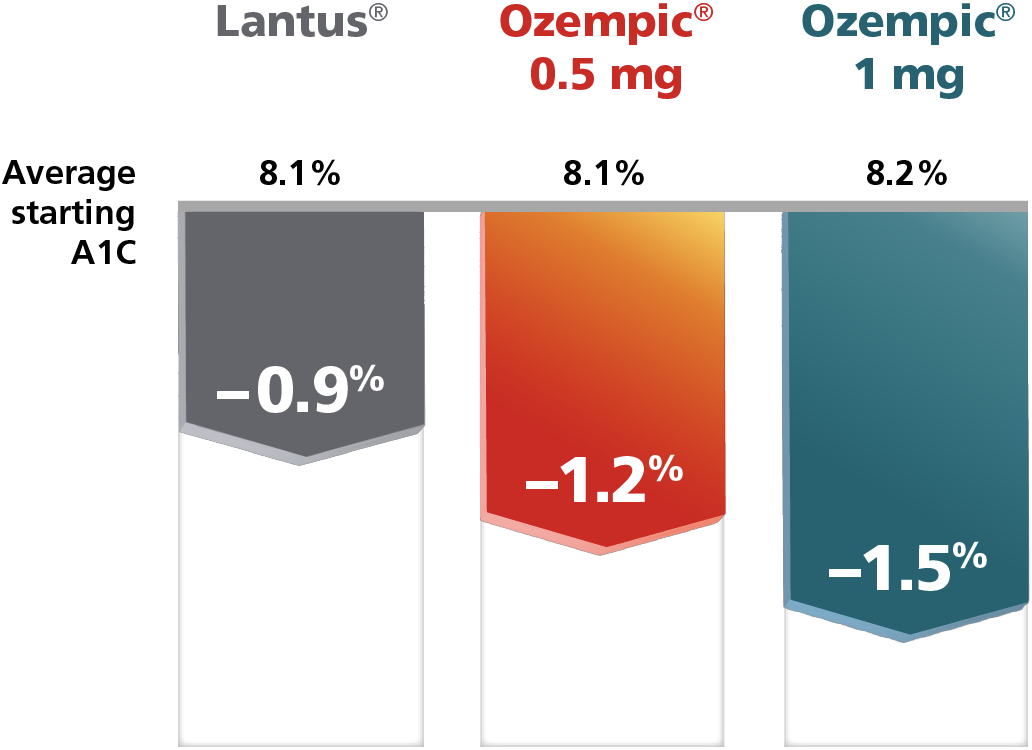
The most common side effects of Ozempic® may include nausea, vomiting, diarrhea, stomach (abdominal) pain, and constipation.
In the same study, Ozempic® helped more people reach an A1C goal of less than 7%.
40%
of people with a starting A1C of 8.1% who took Lantus® lowered their A1C below 7%
vs
55%
of people with a starting A1C of 8.1% who took Ozempic® 0.5 mg lowered their A1C below 7%
vs
66%
of people with a starting A1C of 8.2% who took Ozempic® 1 mg lowered their A1C below 7%

Ozempic® was shown to help people lose more weight than these type 2 diabetes medicines.
Ozempic® is not a weight-loss drug. It is a medicine for adults with type 2 diabetes that, along with diet and exercise, may improve blood sugar.
People lost more than double the weight on Ozempic® vs Trulicity®
Results are from a 40-week study that compared Ozempic® 0.5 mg with Trulicity® 0.75 mg and Ozempic® 1 mg with Trulicity® 1.5 mg in 1201 adults with type 2 diabetes who were taking metformin. While many people in clinical trials lost weight, some did gain weight. Ozempic® is not a weight-loss drug.
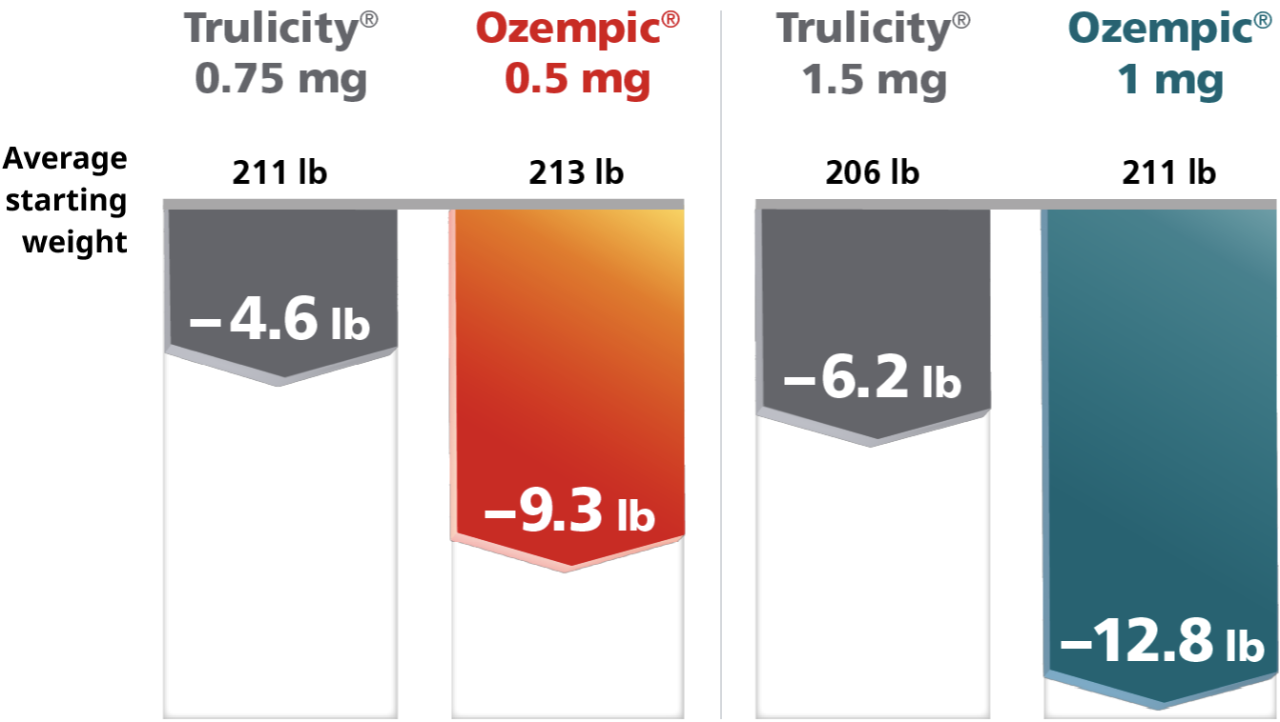
Selected Important Safety Information:
Ozempic® may cause serious side effects, including:
- gallbladder problems. Gallbladder problems have happened in some people who take Ozempic®. Tell your health care provider right away if you get symptoms which may include: pain in your upper stomach (abdomen), fever, yellowing of the skin or eyes (jaundice) or clay-colored stools
Ozempic® helped people lose more weight vs Bydureon®
Results are from a 56-week study that compared Ozempic® 1 mg with Bydureon® 2 mg in 813 adults with type 2 diabetes in combination with metformin or metformin and sulfonylurea. While many people in clinical trials lost weight, some did gain weight. Ozempic® is not a weight-loss drug.
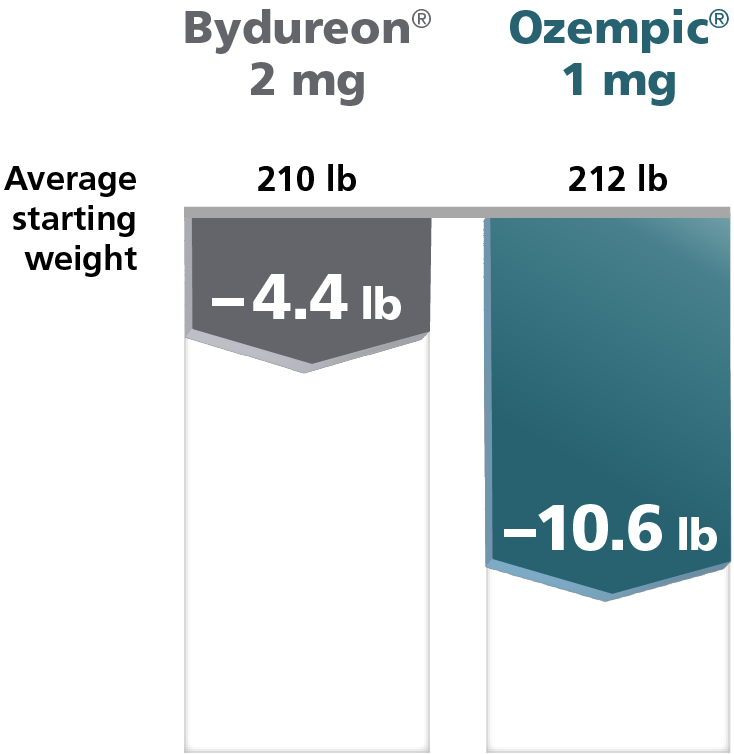
Selected Important Safety Information:
Ozempic® may cause serious side effects, including:
- gallbladder problems. Gallbladder problems have happened in some people who take Ozempic®. Tell your health care provider right away if you get symptoms which may include: pain in your upper stomach (abdomen), fever, yellowing of the skin or eyes (jaundice) or clay-colored stools
Ozempic® helped people lose more weight vs Januvia®
Results are from a 56-week medical study with 1231 adults with type 2 diabetes which compared Ozempic® with the leading branded pill, Januvia®, when both were added to one or more diabetes pills. While many people in clinical trials lost weight, some did gain weight. Ozempic® is not a weight-loss drug.
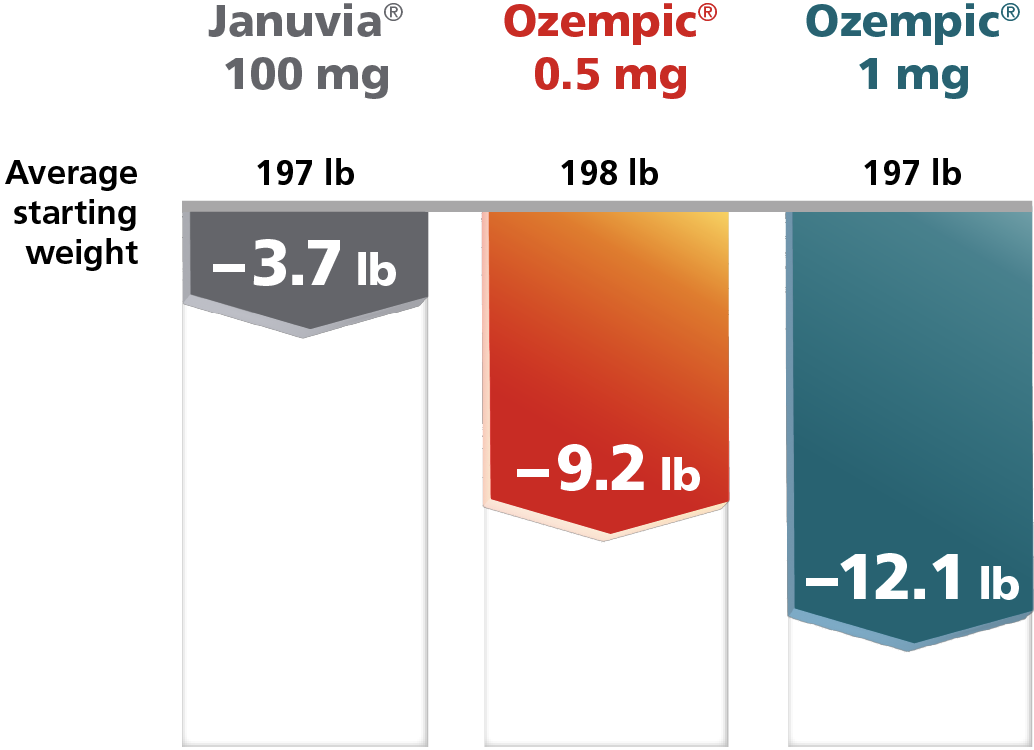
Selected Important Safety Information:
Ozempic® may cause serious side effects, including:
- gallbladder problems. Gallbladder problems have happened in some people who take Ozempic®. Tell your health care provider right away if you get symptoms which may include: pain in your upper stomach (abdomen), fever, yellowing of the skin or eyes (jaundice), or clay-colored stools
People lost more weight with Ozempic® vs Lantus®
Results are from a 30-week study that compared Ozempic® 0.5 mg and 1 mg with Lantus® in 1089 adults with type 2 diabetes. While many people in clinical trials lost weight, some did gain weight. Ozempic® is not a weight-loss drug.
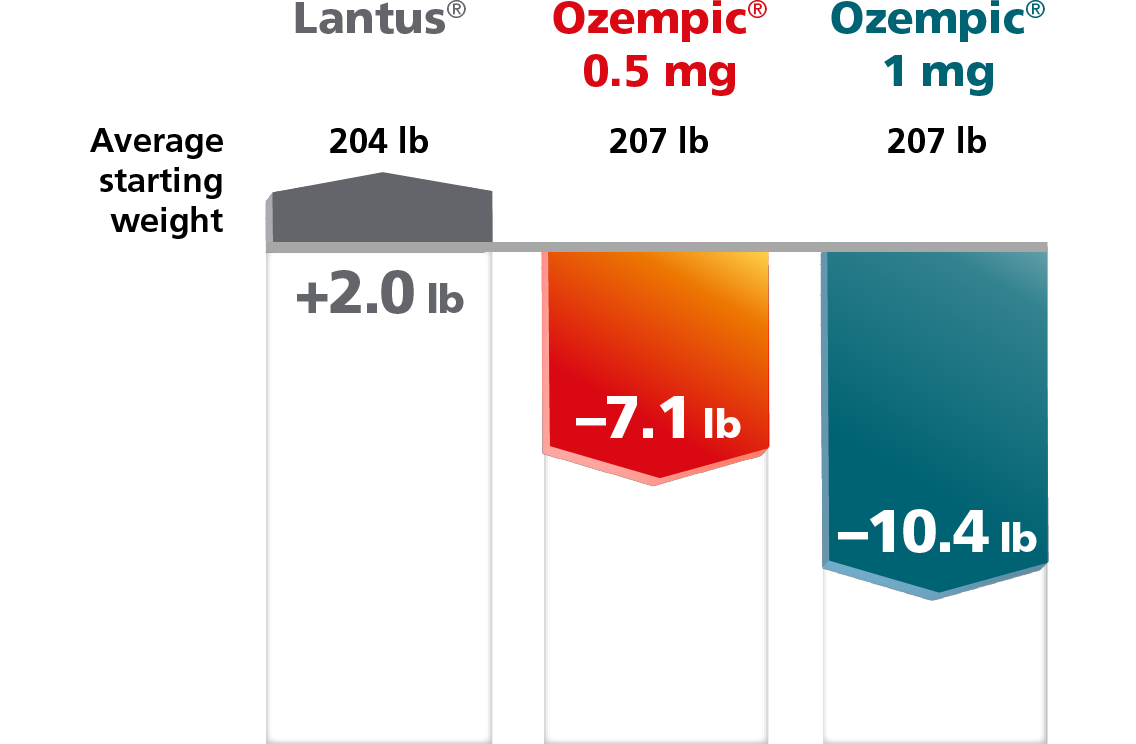
Selected Important Safety Information:
Ozempic® may cause serious side effects, including:
- gallbladder problems. Gallbladder problems have happened in some people who take Ozempic®. Tell your health care provider right away if you get symptoms which may include: pain in your upper stomach (abdomen), fever, yellowing of the skin or eyes (jaundice), or clay-colored stools
Are you struggling to lower your A1C goal with insulin alone?
In a randomized 30-week study of 397 adults with type 2 diabetes, Ozempic® was proven to help people with type 2 diabetes lower their A1C when added to a treatment plan that included taking insulin with or without metformin.
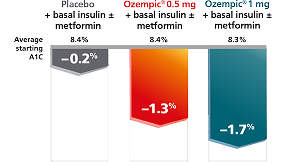
Ozempic® may cause serious side effects, including low blood sugar (hypoglycemia). Your risk of getting low blood sugar may be higher if you use Ozempic® with another medicine that can cause low blood sugar, such as a sulfonylurea or insulin. Signs and symptoms of low blood sugar may include: dizziness or lightheadedness, blurred vision, anxiety, irritability or mood changes, sweating, slurred speech, hunger, confusion or drowsiness, shakiness, weakness, headache, fast heartbeat, and feeling jittery.
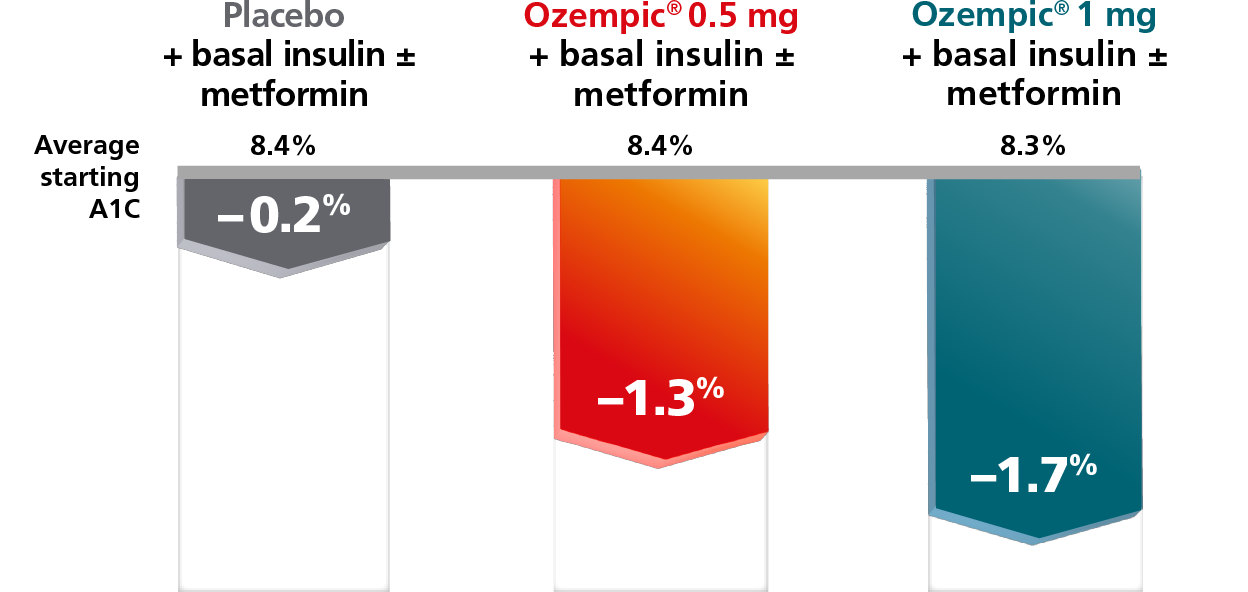

Curious how to take Ozempic®?
Discover how to use the once-weekly Ozempic® pen.


